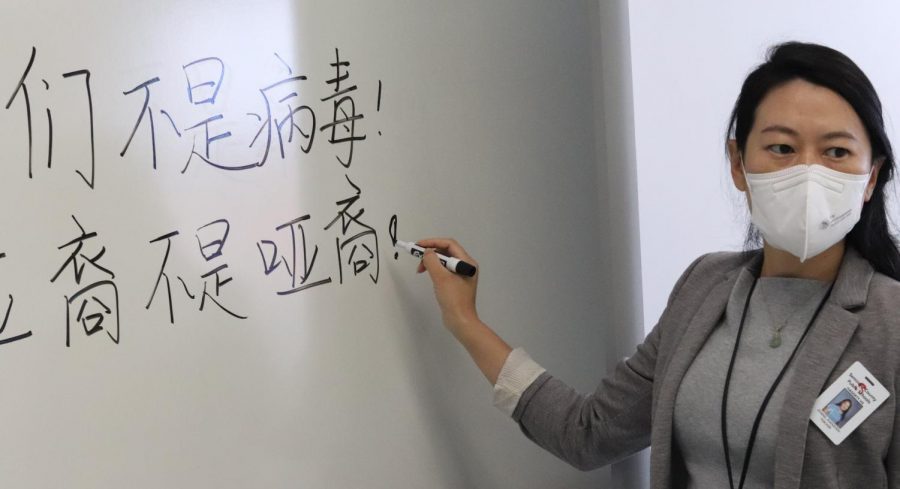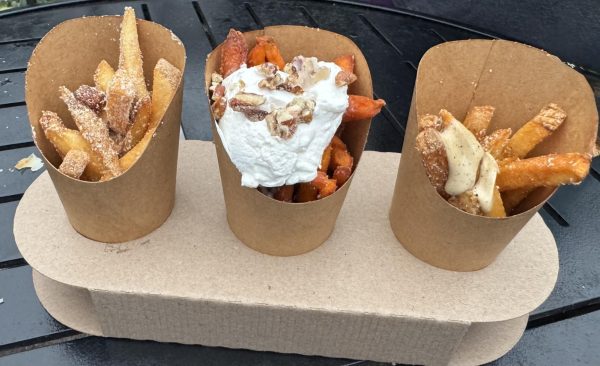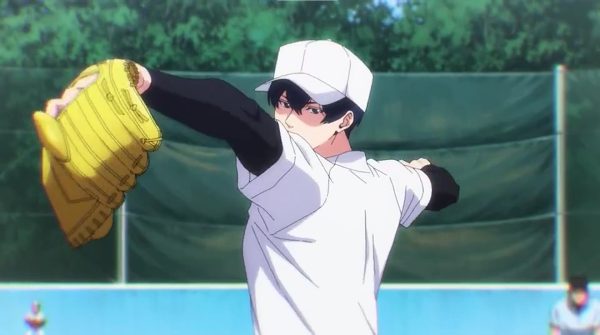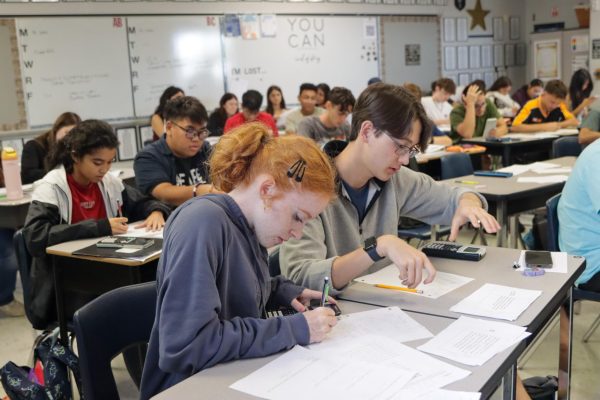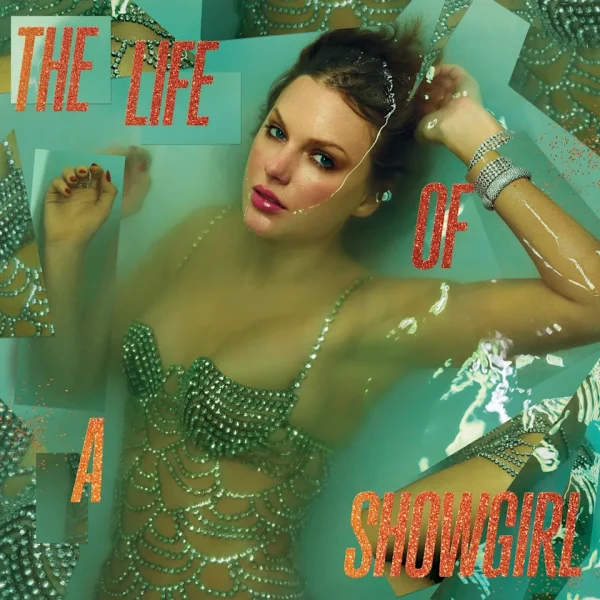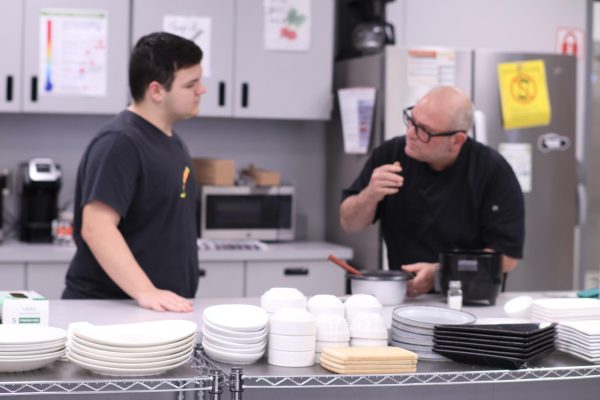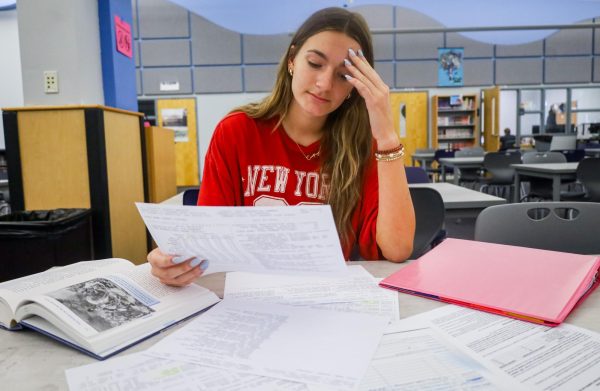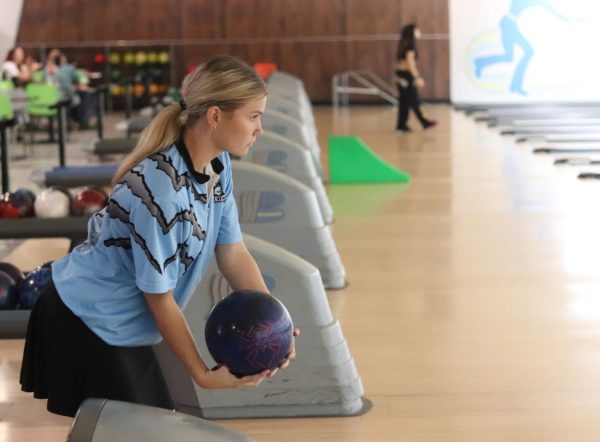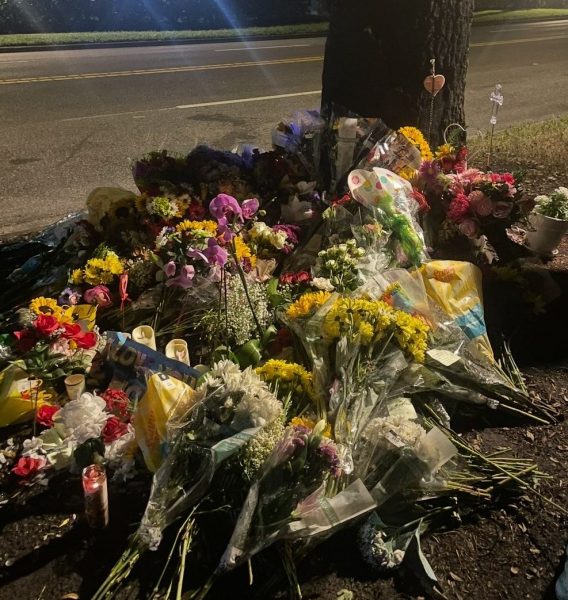When I have a bad day
photo by Zoey Young
Chinese teacher Mrs. Zhang teaches both Mandarin and Chinese culture to students. Zhang also sponsors the Asian Culture Club, in which they discussed the recent attacks on the Asian-American community.
When I have a bad day, I drive home in silence. When I have a bad day, I go straight to bed and stare at my phone for hours. When I have a bad day, I rant to my friends, imagining myself as Keira Knightley uttering a devastating speech to those who have wronged me.
I do not murder eight innocent people. I do not set out to enact homicidal vengeance in a fit of prejudiced rage.
On March 16, gunman Aaron Long murdered eight people at three spas/massage parlors. The shooting is yet another indication that the situation runs deeper than Long’s actions and intent. It runs deeper than the increase of Asian-American violence since the emergence of COVID-19 in Feb. 2020. It is a problem with America’s treatment of Asian-Americans in history, which has long been ignored.
It should not take multiple deaths to finally address anti-Asian violence and make official moves.
The victims’ names were Xiaojie Tan, Daoyou Feng, Soon Chung Park, Hyun Jung Grant, Sun Cha Kim, Yong Ae Yue, Delaina Yaun and Paul Andre Michels. As of March 23, it has not been officially named a hate crime by federal officials.
The United States Department of Justice defines a hate crime as a crime motivated by bias.
Read those names again. Six of the victims were Asian and seven were women. USA TODAY reported March 19 that Long was planning on heading to more massage parlors in Florida and the New York Times reported Mar. 19 that his reasoning was to curb his “temptation,” as he had a sex addiction. It is absolutely clear that this was not random and that Long made a conscious decision as to who he wanted to harm.
As an Asian-American girl, this feels eerily close to me. It is true that I was adopted by two Caucasian parents and there is no doubt that I am wholly assimilated into the Western lifestyle. However, I have monolids, coarse, black hair and a generally flat face. While not applicable to the entire Asian race, these features make it obvious that I am Chinese.
I cannot get rid of these traits and neither can any other Asian woman, including the six who were fatally shot because of Long’s, at the very least, inappropriate fetishization and sexualization of an entire race.
We are not fragile dolls or mail-order brides. We are not your mysterious dragon lady or your favorite anime character come-to life. We are not your “temptation.” Asians exist as real people that live real lives.
Yellow fever, or having a fetish for Asian people because they are Asian, is commonly joked about, but it is completely real.
Commonly known as “weeaboos,” avid “fans” of Japanese culture are rampant. Except that they are not fans of Japanese culture as a whole. They are fans of what they see on travel sites, anime and social media, with no regard for actual Japanese customs: just the “cute,” often fictitious aspects of it. The same can be said for “koreaboos,” who are obsessed with Korean pop culture and celebrities. Hello Kitty and BTS are not accurate representations of Japan or Korea, and this obsession has led to dangerous extremes.
On my end, I am thankful to have received the considerably lesser end of this bias. People insist that I look exactly like Grey’s Anatomy’s Cristina Yang, who is played by Korean, curly-haired actress Sandra Oh. Occasionally, people tell me I look like an anime character even though I am not Japanese, nor a cartoon drawing.
On the other end, other girls are sexually assaulted, exploited, raped and objectified. March 16 is a reminder that many are killed because of such outlandish fantasies. But the Asian community didn’t need a reminder, especially one as horrific as this.
Unfortunately, the rest of the U.S was shocked at the events in Atlanta. How could it happen? Where did this come from?
For a long time, Asian-American hate and racism has been swept under the rug. We briefly learn about the Japanese internment camps and bombings in Nagasaki and Hiroshima, but only America’s point of view. Other than that, little is known about racist Asian history and oftentimes, Asian-American crimes do not get brought up in the news.
What came as a nasty surprise for many, is actually a culmination of the increased number of hate crimes against Asian-Americans since the emergence of COVID-19 in Feb. 2020. According to broadcast company Voice of America in 2021, there were more than 100 pronounced Asian hate crimes in the biggest U.S cities, more than double the numbers in 2019.
Suddenly, a “wet market” was foreign, alien and barbaric, despite it literally meaning a market selling perishable goods, such as fresh fruit, vegetables, fish, meat and livestock. Something globally known, was suddenly relegated to a Chinese plague factory. Phrases like the “Kung-Flu” and the “China Virus” were circulated, and the people who looked down on Asian people for being unhygienic were spitting and coughing on the elderly.
The same people who invest in Asian skincare products called me dirty. The same people who post “fox-eye” make-up tutorials on Youtube stretched their eyes back and made fun of me for having the eye shape they now desire.
It seems we, as Asian-Americans, do not get enough likes on social media for people to care. People want to peacefully continue to consume products of Asian labor, but also continue to mock the Asian employees who do their nails and the Asian families who make their favorite take-out.
Known as the model-minority myth, the racist idea that Asians are the ideal minority in America is reflected in Western culture. Our supposedly obedient nature and our innate intelligence are why we should not be angry or demand change. It seems that if a couple of Asian-Americans succeed, then all of us succeed.
There is a conflicting message. Some believe that we are all good at math and aim to be doctors. Some believe that we are only meant to give pedicures and work as underpaid cooks. In Long’s case, he believed that Asian women were supposed to work at massage parlors and dole out sexual favors.
The model-minority can be confusing at times, but one thing is certain: whether we work at a nail spa or go to Harvard, we are to sit down and shut up, even if it means the death of our own.
Your donation will support the student journalists of Hagerty High School. We are an ad-free publication, and your contribution helps us publish six issues of the BluePrint and cover our annual website hosting costs. Thank you so much!


